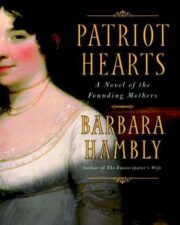My mother cried, Shakespeare’s Beatrice said of her birth; but then there was a star danced, and under that I was born….
Were you born, little grandson, under a dancing star?
“Hush, dear, it’s all right,” she whispered, and stroked Nabby’s hair. “It’s a boy, and it’s all done and over.”
But as Nabby held out her arms for Baby Will, Abigail thought again, It was Johnny’s departure, not Royall’s inconstancy, that sent her into William Smith’s strong arms.
She frowned at the idea, wondering if it were true. Certainly Nabby had been desolated when her oldest brother sailed for Boston, just before the family left Paris for London. And in London, Colonel Smith had been waiting, big and handsome and self-confident; a hero of the War, and not a man to let letters and papers go undelivered and unanswered for months at a time. The Colonel had lived with them for a while when first they’d taken up residence in Grosvenor Square; he’d been attracted to Nabby instantly.
And just as quickly, Abigail admitted to herself, she herself had been drawn to Colonel Smith. She had favored the match, and encouraged it, glad, this time, that Nabby was being courted by a man who would care for her.
For Nabby needs someone, she thought, when a few minutes later deep voices boomed below in the hall. Seeing her reunited with Johnny—seeing her return to smiling wakefulness like the princess in a fairy-tale in Paris—had showed her that. And while Abigail might rail to John about the social laws that robbed a woman of an education, or the judicial ones that forbade her ownership of her own property, she was conscious enough of the world’s ways to know that a woman alone would be subtly ostracized.
She was aware, too—and a little disappointed—that Nabby had not her own strength, nor the sharpness of mind that made her welcome John’s temper-tantrums and the stimulation of politics and literature.
Nabby wanted a companion, the way our Johnny wanted one, all those years of travel to Russia and France. Johnny’s latest letter from Harvard returned to Abigail’s mind. The unhappiness in it was unmistakable as he drove himself in his studies like a man possessed. Nabby was as wretched without a companion as Johnny is now.
Would Colonel Smith’s suit have succeeded, had her brother been here for her to laugh with instead?
The thought was an unsettling one. Abigail tried to put it aside as she helped Esther clothe Nabby in a fresh nightdress and bore her to the bed while Mrs. Throckle wrapped little Will in the dress of tucked lawn that Nabby and Abigail had embroidered that winter. Like the dresses I made for Nabby, Abigail thought, remembering those evenings at the kitchen table, stitching while John wrote articles about the Stamp Act beside her.
So far we have come.
Then the men were in the room, Colonel Smith catching first his new son, then his wife, then Esther and Abigail and Mrs. Throckle and the little assistant each in his giant embrace, laughing all the while with one incompletely powdered lock of raven-black hair hanging in his eyes.
And John was quietly holding Nabby’s hand, his gruff-tempered Yankee face glowing with the softness of absolute love as he looked down at his first grandchild. “We have a new little American,” he said gently, and bent to kiss Nabby’s cheek.
“A new citizen of a new Republic,” agreed Abigail, and joined him by the bed, his arm slipping around her waist. “Colonel Smith works for the legation, which should qualify this house as American soil, I think.”
From somewhere, Colonel Smith produced a decanter and a glass, which he filled and held high: “To America’s newest citizen! May he bring confusion to that scoundrel Carmarthen and may he ram their wretched treaty down their throats!”
Nabby smiled at her parents’ enthusiastic declarations of “Hear, hear!” and drew little Will’s head to her breast. But the old withdrawn look was returning to her eyes, that aloof sadness that Abigail had never quite fathomed. As if, with her child in her arms, she still sought for something she had lost, could never retrieve from the river of the past.
Young William Steuben Smith had just begun to raise his head from the pillow, when the first letters reached John from his old Continental Congress friend, birdlike little Elbridge Gerry, concerning the initial sessions of the Constitutional Convention in Philadelphia. The news from Massachusetts had been unsettling: rebellion in the western counties, rumors of separate governments, even, forming in the Ohio Valley, demands for more paper currency, for equal distribution of property, for summary annihilation of all debts. That at least would put paid to any hope of the British living up to their side of the Treaty of Paris. The Tories in London, who had begun their mockery of John Adams the moment he’d become Minister, jeered that the nation of rabble was clearly showing its true colors and speculated as to how long it would be before they either were conquered by England or returned to the fold of their own chastened accord.


"Patriot Hearts: A Novel of the Founding Mothers" отзывы
Отзывы читателей о книге "Patriot Hearts: A Novel of the Founding Mothers". Читайте комментарии и мнения людей о произведении.
Понравилась книга? Поделитесь впечатлениями - оставьте Ваш отзыв и расскажите о книге "Patriot Hearts: A Novel of the Founding Mothers" друзьям в соцсетях.